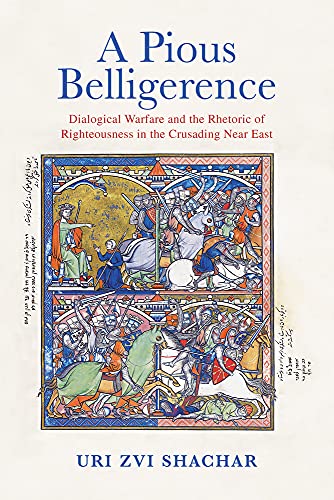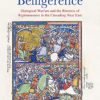A Pious Belligerence: Dialogical Warfare and the Rhetoric of Righteousness in the Crusading Near East (The Middle Ages Series) Hardcover – December 28, 2021 by Uri Zvi Shachar
Hardcover
[320 Pages]
PUB :December 28, 2021
Description
Author: Shachar Uri Zvi
Package Dimensions: 0x229x788
Number Of Pages: 320
Release Date: 28-12-2021
Details: Product Description
In A Pious Belligerence Uri Zvi Shachar examines one of the most contested and ideologically loaded issues in medieval history, the clash between Christians, Muslims, and Jews that we call the Crusades. He does so not to write about the ways these three groups waged war to hold onto their distinct identities, but rather to think about how these identities were framed in relation to one another. Notions of militant piety in particular provided Muslims, Christians, and Jews paths for thinking about both cultural boundaries and codependencies. Ideas about holy warfare, Shachar contends, were not shaped along sectarian lines, but were dynamically coproduced among the three religions.
The final decades of the twelfth century saw a rapid collapse of the Frankish and Ayyubid hegemonies in the Levant, followed by struggles for political dominion that lasted for most of the thirteenth century. The fragmented political landscape gave rise to the formation of multiple coalitions across political, religious, and linguistic divides. Alongside a growing anxiety about the instability of cultural boundaries, there emerged a discourse that sought to realign and reevaluate questions of similarity and difference. Where Christians and Muslims regularly joined forces against their own coreligionists, Shachar writes, warriors were no longer assumed to mark or protect lines of physical or political separation. Contemporary authors recounting these events describe a landscape of questionable loyalties, shifting identities, and unstable appearances.
Shachar demonstrates how in chronicles, apocalyptic treatises, and a variety of literary texts in Latin, French, Arabic, Hebrew, and Judeo-Arabic holy warriors are increasingly presented as having been rhetorically and anthropologically shaped through their contacts with their neighbors and adversaries. Writers articulated their thoughts about pious warfare through rhetorical devices that crossed confessional lines, and the meaning and force of these articulations lay in their invocation of tropes and registers that had purchase in the various literary communities of the Near East. By the late twelfth century, he argues, there had emerged a notion that threads through Christian, Muslim, and Jewish texts alike: that the Holy Land itself generates a particular breed of pious warriors by virtue of the hybridity that it encompasses.
Review
“This fascinating study by Uri Zvi Shachar demonstrates the shortfalls of the general presentation of the crusader period and the interactions between Muslims, Christians, and Jews as dominated by warfare, religious animosity, and exclusion. He shows us that Muslims, Jews, and Christians not only shared the same geography, but they also spoke a similar ‘language’ saturated with common religious and cultural symbolisms, and that was only possible because of the avenues of interactions between them.”—Suleiman A. Mourad, Smith College and IAS Nantes
About the Author
Uri Zvi Shachar is Associate Professor in the Department of General History at Ben-Gurion University.
Excerpt. © Reprinted by permission. All rights reserved.
Introduction
In the spring of 1211, a large group of French-speaking Jews reached the port of Acre with the intention of settling in the Land of Israel. A fifteenth-century chronicle states that this group numbered more than three hundred rabbis, and their families presumably, but even if this figure is somewhat exaggerated, a movement of this size is massive in medieval terms. Nor was it the first—a few years earlier, a smaller contingent from the south of France led by Jonathan ha-Cohen of Lunel took to the sea and reached the Holy Land via Egypt. Both groups, and subsequent ones, included eminent scholars who had made a name for themselves in the intellectual elite of the French-speaking rabbinical world. Sources tell us that the rabbis and their families first settled in Jerusalem, which a few decades earlier had been take
Be the first to review “A Pious Belligerence: Dialogical Warfare and the Rhetoric of Righteousness in the Crusading Near East (The Middle Ages Series) Hardcover – December 28, 2021 by Uri Zvi Shachar”
You must be <a href="https://webdelico.com/my-account/">logged in</a> to post a review.




























There are no reviews yet.